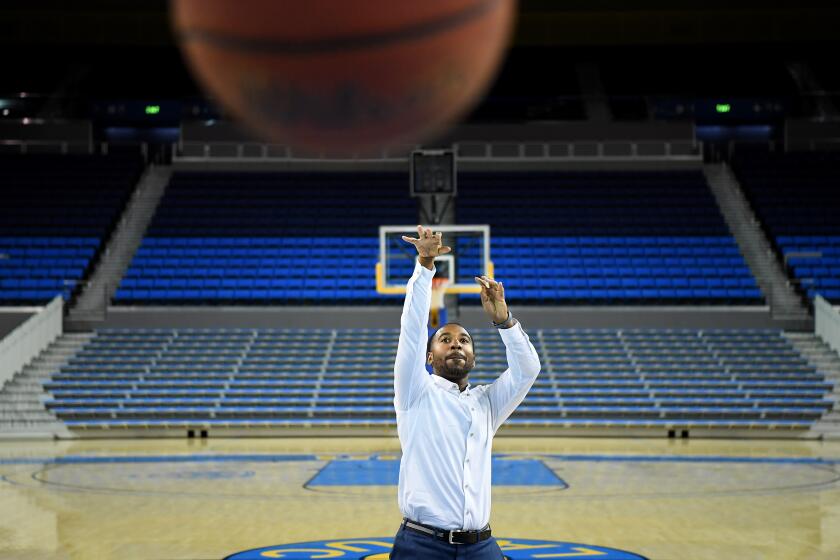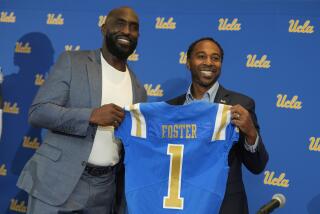A tribute to mom: Why playing North Carolina Central matters to UCLA’s Martin Jarmond
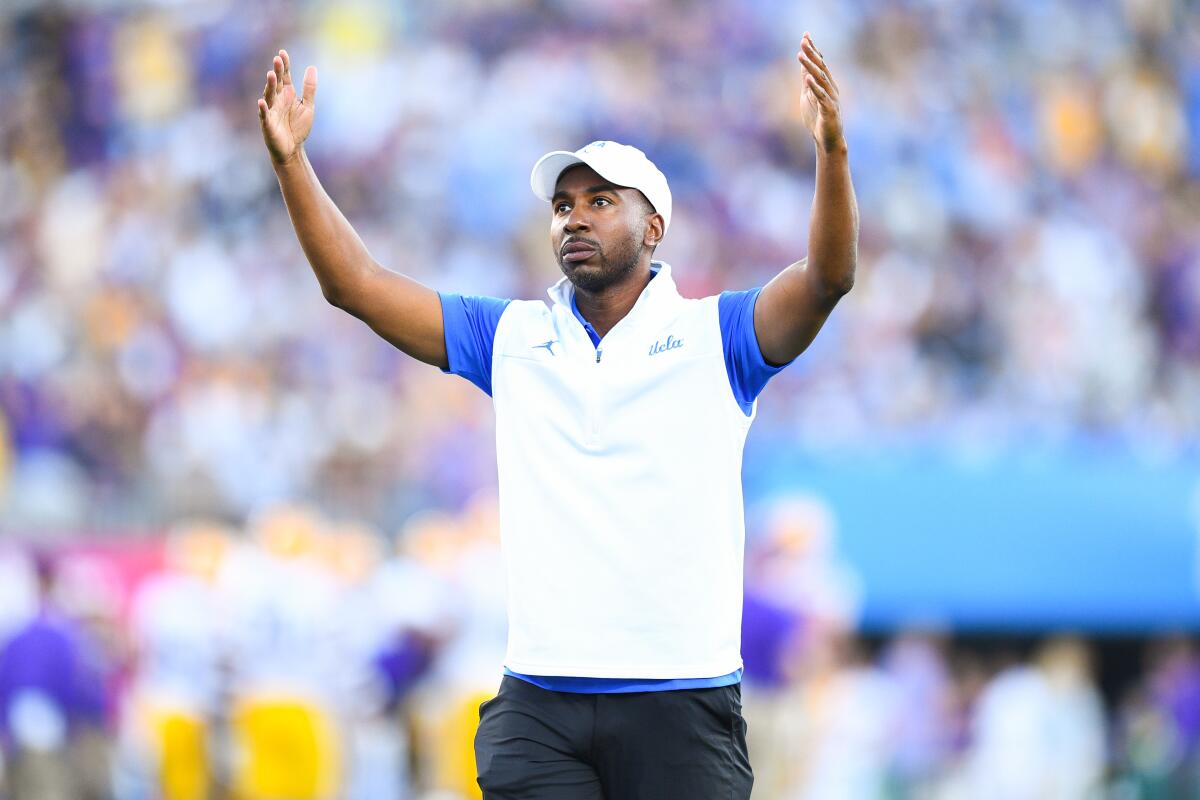
- Share via
The scene that unfolded before the Jarmonds for North Carolina Central’s biggest football game of the season was always one that drew them back, year after year.
The high-stepping, vibrant bands. The impromptu reunions, fans running into former classmates they had not seen in years. The dramatic games that always seemed to come down to the final possession.
That’s just the way it was whenever NCCU played its archrival, North Carolina A&T. It was the Eagles versus the Aggies, and in the home of Martin Jarmond, it was mom versus dad in a battle of alma maters.
The game would be dubbed the Aggie-Eagle Classic or the Eagle-Aggie Classic, depending on the home team. Shunning that tradition, Matt Jarmond always called it the Aggie-Eagle Classic in a nod to his alma mater, A&T, never mind that his wife and mother both went to that other school.
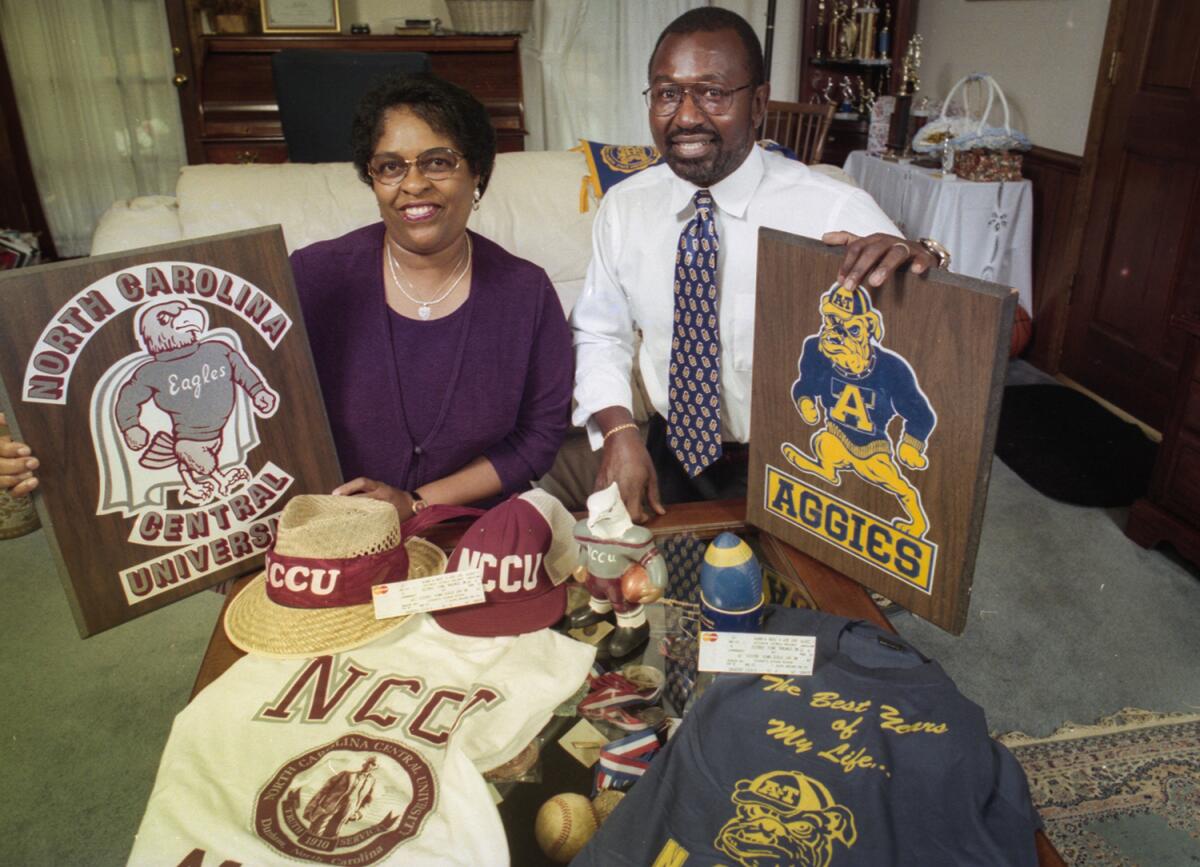
The father’s fanaticism for the blue and gold rubbed off on his son to the point where young Martin just had to root for the Aggies, even if it forced him to hide his preference. Sitting near his mother, Virginia, the family matriarch dressed in the deep maroon of the Eagles, Martin would try not to show his true allegiance.
“He did some cheering for both schools,” Matt remembered.
More than three decades later, a similar story could play out Saturday at the Rose Bowl. As UCLA’s athletic director, Martin will favor the blue and gold while hoping NCCU has a good showing of its own. The North Carolina native’s ties to the Historically Black University based in Durham, N.C., go well beyond the late mother who pushed him to take the UCLA job only weeks before she died of a stroke.
Martin also never would have made it to Westwood without earning the postgraduate scholarship named for John McLendon, the former NCCU men’s basketball coach and civil rights advocate who once staged a secret game against white players from Duke during the Jim Crow era. Known for inventing the fast break, McLendon made a far nobler contribution to sports by accelerating the acceptance of minorities.
“I wouldn’t be where I am today in this profession without John McLendon,” said Jarmond, the first Black athletic director in UCLA history after having held that same designation at Boston College. “Getting that scholarship changed the trajectory of my life.”
For Martin Jarmond, the unexpected death of his mother has given UCLA’s new athletic director an added perspective as he embarks on new challenges.
Returning the favor all these years later, Jarmond invited the school that has meant so much to his family to the Rose Bowl as part of his own efforts to provide new opportunities and change perceptions. It’s only the second time the Bruins will face an HBCU after having hosted Alabama State last year.
“It’s bigger than ball, it’s bigger than the game when you can give young people this kind of experience,” Jarmond said. “It’s priceless because it’s going to change people’s lives.”
Virginia Jarmond’s presence could be felt the moment she opened her mouth or entered a room.
Warm but assured in her convictions, she immediately hit it off with Matt when they met at a social function during the summer before their junior years in college. Neither cared that they didn’t attend the same school and hailed from different counties in North Carolina.
“She was just so friendly,” Matt recalled, with a chuckle.
A budding romance was placed on hold while Virginia spent a semester as an exchange student in Wisconsin. But Matt remained smitten after graduation. His girlfriend who had gotten a job in the corporate office of Burlington Industries, one of the world’s largest textile manufacturers, helped him land one of his own as part of a minority initiative.
They were married over Labor Day weekend in 1969. First child Trey was born in 1974, with Martin following in 1979.
UCLA athletic director Martin Jarmond closes a high-stress year and pushes forward to help the Bruins rebound from COVID-19 pandemic financial losses.
While Virginia might not have been as zealous about football as her husband, she made sure to savor every Eagles victory over their archrival.
“She would rub it in,” Matt said, “and her friends would be calling her, encouraging her to rub it in more.”
Virginia took an equally direct approach with her children, telling them if they could dream it, they could achieve it. In the summer of 2020, when Martin was unsure if he should take a UCLA job that would require moving across the country from not only his post at Boston College but also his parents during the early months of the pandemic, he called his mother. Virginia calmed his fears, telling him this was a challenge he needed to embrace.
“She said, ‘There are airplanes, son, go do this,’ ” Montresa McMillan, Virginia’s niece, recalled her aunt telling Martin. “ ‘This is for you, it’s a great opportunity for you, your skills married to the UCLA brand, there’s so many things you need to do there — you need to go.’ ”
And so Martin was off, knowing he would not have had this opportunity without help from another Central figure.
The moments that can change a life often play out quietly behind the scenes.
Late in Jarmond’s college basketball career at North Carolina Wilmington, where he rose from walk-on to team captain, notice of a minority postgraduate scholarship came across the desk of coach Jerry Wainwright.
The coach encouraged Jarmond to apply, telling him he thought his outgoing personality and ability to connect with others would make him a natural fundraiser in college athletics.
“That was the jumping-off point,” Matt Jarmond said. “Now, just suppose the coach took that bulletin or that notice of the application and its requirements and timeline and threw it in the trash can. Who knows where Martin would be today? Because he certainly would not have applied for the McLendon scholarship, you know what I mean?”
News that Martin had been awarded the scholarship sparked a dayslong celebration in the Jarmond household. The financial support allowed Martin to attend a dual graduate program at Ohio University, where he worked toward master’s degrees in business administration and sports administration.
In exactly one year, USC and UCLA will leave the Pac-12 and join the Big Ten. The schools have embraced detailed game plans to help them thrive.
Sure enough, Jarmond quickly proved to be a gifted fundraiser at his first job in the Michigan State athletic department. It wasn’t long before Ohio State athletic director Gene Smith hired him away from the Buckeyes’ Big Ten rival and later promoted him to deputy athletic director. In 2017, Jarmond got to run his own athletic department when Boston College made him, at 37, the youngest athletic director in a Power Five conference.
Along the way, Jarmond’s appreciation deepened for the man who had made all this possible, opening doors long closed to those who looked like him. As a star basketball player, McLendon had been part of an undefeated junior college team in Kansas City. But he couldn’t suit up for Kansas upon transferring because the Jayhawks’ powerhouse team was segregated.
After landing a coaching job at what was then called the North Carolina College for Negroes, McLendon arranged for his team to face an all-white Duke medical school team stuffed with current and former college players, including a starter for the Blue Devils’ varsity.
The prospects of holding what would come to be known as “The Secret Game” in 1944 were so scandalous that the Duke players reportedly arrived in borrowed cars and pulled their jackets over their heads as they walked into their counterparts’ empty gym. McLendon bolted the doors.
After nerves on both sides subsided, the Eagles used a breakneck pace to rout the team from across town by a score of 88-44. Afterward, the teams mixed their rosters and played a second game featuring shirts and skins. The only loser that day was Jim Crow.
His team was barred from both the NCAA and National Invitational tournaments solely because of the color of its skin, but McLendon was quietly helping change the basketball world.
“He had the wherewithal to know if it was going to be a public thing, it probably wouldn’t have happened,” Jarmond said. “And it was more important for that game to happen, so they could experience that and see that, you know what, these African American young men are just as talented as the Duke young men, and so that was legendary.”
UCLA’s athletic history is flush with racial pioneers. After they left the school, Jackie Robinson broke Major League Baseball’s color barrier, Kenny Washington helped integrate the NFL and Arthur Ashe fought apartheid in South Africa.
The Bruins continue to push for increased minority inclusion in sports, holding a “Black Excellence” gymnastics meet and a “Los Bruins” basketball game, among other endeavors. Washington will be honored Saturday as part of another “Black Excellence” game at the Rose Bowl. Jarmond and basketball coach Mick Cronin have pledged to support the McLendon Minority Leadership Initiative that’s designed to boost minority representation in athletics administration.
In many ways, UCLA is a bastion of diversity. On the current football staff, seven of 12 coaches are people of color, including D’Anton Lynn, the first defensive coordinator in school history to make more than $1 million per year.
“The beauty of that is that I didn’t even know that,” Jarmond said when informed of the racial breakdown of the coaching staff. “And the reason why is, that’s something we live. We don’t just talk about diversity, we live it, we breathe it. So I didn’t even know that. I am proud of that. It’s great, but it can be better as well and we’re mindful of that, but our coaches really believe in diversity — diversity of thought, diversity of experiences.”
That’s why bringing an HBCU to the Rose Bowl is equally beneficial to the Bruins. A year ago, Jarmond lost track of how many people told him they enjoyed watching the Alabama State band, which received a standing ovation after its halftime performance. As part of a $700,000 guarantee for coming to the Rose Bowl, NCCU will bring its Sound Machine Marching Band.
“One of the things, especially in college athletics, that I’m not sure people understand is that the money games for FCS programs are a really big deal,” UCLA coach Chip Kelly said, referring to the Football Championship Subdivision in which teams like NCCU play, “and that’s how some of those programs survive.”
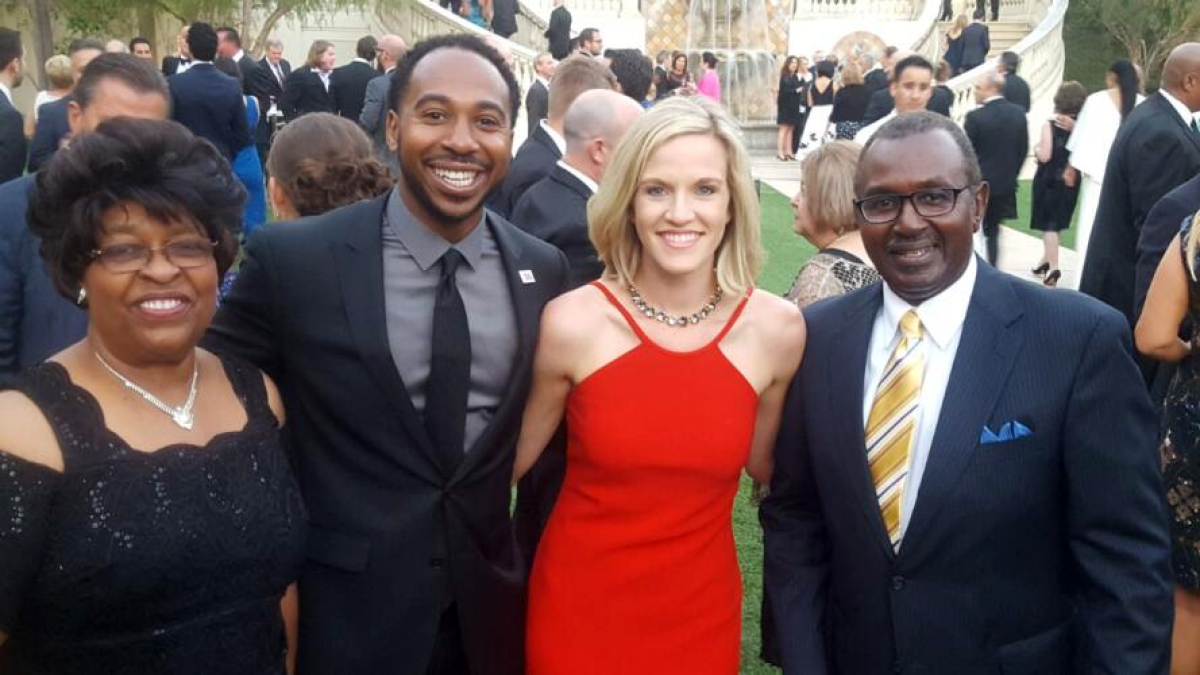
They also provide new experiences, such as a trip to the West Coast. Making that same journey will be Matt Jarmond and his fiancee, Kay Cunningham. Matt hasn’t rooted for the Eagles before and doesn’t intend to start now considering his son’s ties to the home team.
Asked about his allegiance Saturday, Matt said, “Go Bruins!”
Another family member expected at the Rose Bowl will bear a striking resemblance to Virginia Jarmond. McMillan considers her likeness to her aunt fitting given that she thought of her as a mother figure. McMillan’s presence will honor her late aunt as well as the first cousin who runs the UCLA athletic department. Seated nearby will be husband Donald, who attended NCCU and will be rooting for an upset.
Those who know her say the confluence of teams and allegiances would not have left Virginia Jarmond conflicted, no matter the final score.
“She would have been in the middle of all of this and she would have been so, so proud of her alma mater coming together with UCLA, where her son is, and her love for her son and her love for North Carolina Central University,” McMillan said. “I can just see her smiling now as I talk about it.”
More to Read
Go beyond the scoreboard
Get the latest on L.A.'s teams in the daily Sports Report newsletter.
You may occasionally receive promotional content from the Los Angeles Times.

